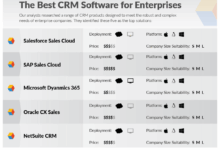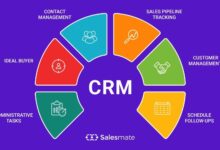AI-Powered CRM Software: Revolutionizing Customer Relations
AI-Powered CRM Software is transforming how businesses manage customer relationships. This technology leverages artificial intelligence to automate tasks, analyze data, and provide actionable insights, ultimately leading to improved efficiency and customer satisfaction. From lead scoring and sales forecasting to personalized marketing and streamlined customer service, AI’s impact is undeniable.
This exploration delves into the core functionalities of AI-powered CRM systems, examining their benefits, implementation, and future trends. We’ll explore how businesses are leveraging AI to enhance their customer interactions, gain a competitive edge, and drive revenue growth. We’ll also address common challenges and considerations for successful implementation.
Defining AI-Powered CRM Software
AI-powered CRM software represents a significant evolution from traditional CRM systems. While traditional CRMs primarily focus on data organization and management, AI-powered CRMs leverage artificial intelligence to automate tasks, predict customer behavior, and provide deeper insights into customer interactions, ultimately leading to improved sales, marketing, and customer service outcomes. This enhancement allows businesses to move beyond simple data storage and towards proactive, intelligent engagement with their customer base.
AI-powered CRM software goes beyond the basic functionalities of traditional systems by incorporating advanced analytical capabilities and predictive modeling. This allows for a more proactive and personalized approach to customer relationship management. The core difference lies in the ability to anticipate customer needs and automate responses, streamlining workflows and improving efficiency across the entire customer lifecycle.
Core Functionalities and Features
The distinguishing features of AI-powered CRM solutions revolve around automation, prediction, and personalization. These systems utilize AI to automate repetitive tasks such as data entry, lead qualification, and email marketing campaigns. Predictive capabilities allow for forecasting future customer behavior, enabling proactive engagement and targeted marketing efforts. Finally, AI facilitates personalization by tailoring communications and offers to individual customer preferences and needs, fostering stronger customer relationships and loyalty. Examples include automated lead scoring based on predictive models, personalized email recommendations, and chatbot interactions providing instant customer support.
AI Technologies Integrated into CRM Software
Several types of AI technologies are integrated into modern CRM systems to enhance their capabilities. Machine learning algorithms are used extensively for predictive modeling, such as forecasting sales, identifying churn risk, and recommending optimal pricing strategies. For example, a machine learning model could analyze past customer data to predict which leads are most likely to convert into paying customers, allowing sales teams to prioritize their efforts effectively. Natural language processing (NLP) enables the system to understand and respond to human language, powering features like chatbots and sentiment analysis. Sentiment analysis, for example, can assess the emotional tone of customer reviews or social media posts, allowing businesses to identify areas for improvement in their products or services. Other AI technologies used include computer vision (for image analysis in customer interactions), and robotic process automation (RPA) for automating complex, multi-step business processes.
Benefits of AI in CRM
Integrating Artificial Intelligence (AI) into Customer Relationship Management (CRM) systems offers significant advantages, transforming how businesses interact with customers and manage their sales processes. AI’s ability to analyze vast datasets and identify patterns allows for more efficient and effective operations across sales, marketing, and customer service. This results in improved lead conversion rates, increased sales predictability, and enhanced customer satisfaction.
AI-Enhanced Lead Scoring and Prioritization
AI significantly improves lead scoring and prioritization by analyzing various data points such as website activity, email engagement, and social media interactions. Instead of relying on basic demographic information, AI algorithms assess the likelihood of a lead converting into a paying customer. For example, an AI-powered CRM might identify a lead who frequently visits product pages, downloads white papers, and actively engages with marketing emails as a high-potential prospect, prioritizing them for immediate follow-up by sales representatives. Conversely, leads showing minimal engagement are flagged as lower priority, freeing up sales resources to focus on higher-potential opportunities. This allows sales teams to focus their efforts where they are most likely to yield results, ultimately boosting conversion rates.
AI’s Impact on Sales Forecasting and Pipeline Management
AI revolutionizes sales forecasting and pipeline management by analyzing historical sales data, market trends, and current pipeline activities to provide more accurate predictions. Traditional methods often rely on gut feeling or simple extrapolations, leading to inaccurate forecasts. AI algorithms, however, can identify complex patterns and correlations, leading to more precise sales predictions. For instance, an AI-powered CRM can predict the likelihood of closing a deal based on factors such as deal size, sales stage, and the engagement level of the prospect. This improved accuracy allows businesses to make more informed decisions regarding resource allocation, budget planning, and strategic initiatives.
AI-Driven Customer Segmentation and Personalization
AI empowers businesses to create highly targeted customer segments based on detailed behavioral and demographic data. Instead of broad segmentation, AI algorithms can identify subtle differences in customer preferences and needs, enabling hyper-personalization. For example, an AI-powered CRM might identify a group of customers who consistently purchase a specific product line and frequently engage with educational content related to that product. This allows the business to tailor marketing campaigns, product recommendations, and customer service interactions specifically to this segment, improving engagement and loyalty.
AI Streamlining Customer Service Interactions
AI streamlines customer service interactions through features such as chatbots and automated responses. These AI-powered tools can handle routine inquiries, provide instant support, and escalate complex issues to human agents efficiently. This reduces response times, improves customer satisfaction, and frees up human agents to focus on more complex problems. For instance, a chatbot can instantly answer frequently asked questions about product features or shipping times, providing immediate resolution to simple issues. This leaves human agents to focus on more intricate problems requiring their expertise.
Efficiency Gains Comparison: AI-Powered CRM vs. Traditional CRM
| Feature | Traditional CRM | AI-Powered CRM | Improvement Percentage |
|---|---|---|---|
| Sales Lead Qualification | Manual process, prone to errors | Automated scoring and prioritization | 50-70% |
| Sales Forecasting | Based on historical data and estimations | Predictive analytics with higher accuracy | 20-40% |
| Marketing Campaign Personalization | Broad segmentation, limited personalization | Highly targeted campaigns based on AI insights | 30-50% |
| Customer Service Response Time | Longer wait times, potential for missed issues | Automated responses and efficient escalation | 40-60% |
AI Features in CRM Software
AI is rapidly transforming CRM systems, moving beyond basic contact management to offer powerful predictive and automated capabilities. These advancements significantly improve efficiency, personalize customer interactions, and drive revenue growth. This section details key AI features categorized for clarity.
AI Features Categorized by CRM Function
AI’s integration into CRM software enhances various functionalities. The features are broadly categorized into sales intelligence, marketing automation, and customer support to illustrate their impact on different aspects of customer relationship management.
Sales Intelligence Features
Effective sales strategies rely on accurate insights. AI-powered sales intelligence tools provide these insights, enabling sales teams to focus their efforts on high-potential leads and close deals more efficiently.
- Lead Scoring and Prioritization: AI algorithms analyze lead data (website activity, demographics, engagement levels) to assign scores indicating the likelihood of conversion. This allows sales reps to prioritize high-value leads, maximizing their time and resources.
- Sales Forecasting and Prediction: By analyzing historical sales data, AI can predict future sales trends, enabling proactive adjustments to sales strategies and resource allocation. For example, a CRM might predict a dip in sales during a specific quarter, allowing the sales team to prepare a targeted campaign.
- Opportunity Management: AI can identify opportunities that are at risk of failing to close, alerting sales representatives to intervene and implement strategies for successful closure. This might involve suggesting personalized outreach or identifying potential roadblocks.
Marketing Automation Features
AI streamlines marketing efforts, personalizing customer experiences and optimizing campaign performance.
- Personalized Email Marketing: AI analyzes customer data to tailor email content and timing, resulting in higher engagement rates. For instance, emails can be dynamically adjusted based on past purchases or browsing history.
- Targeted Advertising: AI algorithms analyze customer demographics, behavior, and preferences to optimize ad targeting, maximizing ROI on advertising campaigns. This could mean showing different ads to different customer segments on social media.
- Chatbots and Conversational AI: AI-powered chatbots handle routine customer inquiries, providing instant support and freeing up human agents to focus on more complex issues. These chatbots can be trained to answer frequently asked questions and even escalate complex queries to a human representative.
Customer Support Features
AI enhances customer support by improving response times, personalizing interactions, and resolving issues more efficiently.
- Sentiment Analysis: AI analyzes customer feedback (e.g., from surveys, reviews, or social media) to gauge customer sentiment, identifying areas for improvement in products or services. This allows businesses to proactively address negative feedback.
- Self-Service Knowledge Bases: AI powers intelligent search within knowledge bases, enabling customers to quickly find answers to their questions without needing human assistance. This reduces support ticket volume and improves customer satisfaction.
- Automated Ticket Routing: AI intelligently routes support tickets to the most appropriate agents based on the issue’s nature and the agent’s expertise, improving efficiency and resolution times. This ensures that customers receive faster and more effective support.
Workflow of a Customer Interaction in an AI-Powered CRM
This flowchart illustrates a simplified workflow:
[Imagine a flowchart here. The flowchart would start with a “Customer Interaction” (e.g., email, chat, phone call). This would feed into an “AI-Powered CRM System” box. Branches would then show different paths: If the interaction is simple (e.g., FAQ), it would go to an “Automated Response” box (chatbot, automated email). If the interaction is complex, it would go to an “Agent Assignment” box, where the AI routes the interaction to the appropriate human agent. Both paths would eventually lead to a “Resolution” box, followed by a “Customer Feedback” box that feeds back into the AI system for continuous improvement.]
Implementation and Integration of AI-Powered CRM
Implementing an AI-powered CRM system requires a strategic approach encompassing careful planning, execution, and ongoing monitoring. Success hinges on understanding your business needs, selecting the right technology, and effectively integrating it with existing systems. A phased rollout often proves more manageable than a complete system overhaul.
Implementing an AI-powered CRM involves several key steps. A thorough needs assessment is crucial to define specific objectives and desired outcomes. This involves identifying pain points in your current CRM processes and determining how AI can address them. Following this, a suitable AI-powered CRM solution must be selected, considering factors such as scalability, integration capabilities, and vendor support. Data migration from existing systems requires careful planning and execution to ensure data integrity and minimize disruption. Finally, comprehensive training for users is essential to maximize adoption and ensure effective utilization of the new system’s features.
Implementation Steps
The implementation process typically follows a structured methodology. First, a detailed project plan is developed, outlining timelines, resources, and responsibilities. Next, the chosen AI-powered CRM system is configured to meet the specific requirements of the business. This includes customizing workflows, dashboards, and reports. Data migration from legacy systems is then undertaken, often involving data cleansing and transformation to ensure compatibility with the new system. Following this, rigorous testing is conducted to identify and resolve any issues before the system goes live. Finally, ongoing monitoring and optimization are essential to ensure the system continues to meet the evolving needs of the business.
Challenges and Considerations During Implementation
Several challenges can arise during the implementation of an AI-powered CRM system. Data quality is a significant concern; inaccurate or incomplete data can hinder the effectiveness of AI algorithms. Integration with existing systems can be complex, requiring careful planning and coordination. Resistance to change from employees accustomed to existing workflows can also impede adoption. Furthermore, ensuring data security and privacy is paramount, requiring robust security measures and adherence to relevant regulations. Finally, the ongoing maintenance and updates required for an AI-powered system should be factored into the overall implementation plan.
Integration with Other Business Applications
Integrating an AI-powered CRM with other business applications, such as ERP (Enterprise Resource Planning) systems and marketing automation tools, significantly enhances its value. For instance, integration with an ERP system can provide a unified view of customer interactions and transactions, enabling more informed decision-making. Similarly, integration with marketing automation tools can streamline marketing campaigns and improve customer targeting. These integrations often involve APIs (Application Programming Interfaces) that allow different systems to communicate and exchange data seamlessly. A well-integrated system can automate tasks, improve data consistency, and provide a holistic view of the customer journey.
Cloud-Based versus On-Premise Deployments
Choosing between a cloud-based and an on-premise deployment depends on several factors. Cloud-based solutions offer scalability, accessibility, and reduced infrastructure costs. However, they may involve concerns about data security and vendor lock-in. On-premise deployments offer greater control over data and security but require significant upfront investment in infrastructure and ongoing maintenance. Businesses should carefully evaluate their specific needs, resources, and risk tolerance before making a decision. For example, a small business with limited IT resources might find a cloud-based solution more advantageous, while a large enterprise with stringent security requirements might opt for an on-premise deployment.
Case Studies and Examples
The successful implementation of AI-powered CRM systems has demonstrably improved efficiency and profitability across diverse sectors. These examples highlight how AI features have addressed specific business challenges and delivered quantifiable results, offering valuable insights for organizations considering similar implementations. The following case studies illustrate the transformative potential of AI in CRM.
AI-Driven Sales Forecasting in a Tech Company
A leading technology company implemented an AI-powered CRM system to enhance its sales forecasting accuracy. The system analyzed historical sales data, market trends, and customer interactions to generate more precise predictions. This improved forecasting led to better inventory management, optimized resource allocation, and a significant reduction in lost sales opportunities. The company reported a 15% increase in sales accuracy and a 10% reduction in inventory holding costs within the first year of implementation.
Improved Customer Service with AI-Powered Chatbots in a Retail Business
A major retail chain integrated AI-powered chatbots into its CRM system to handle a large volume of customer inquiries. The chatbots provided immediate responses to frequently asked questions, freeing up human agents to focus on more complex issues. This resulted in reduced customer wait times, improved customer satisfaction scores (a 20% increase), and a 12% decrease in customer service operational costs. The chatbots were programmed to learn from each interaction, constantly improving their ability to accurately address customer needs.
Targeted Marketing Campaigns with AI-Driven Customer Segmentation in a Financial Institution
A large financial institution leveraged AI-powered CRM to segment its customer base based on various factors such as demographics, financial behavior, and past interactions. This allowed the institution to create highly targeted marketing campaigns with personalized offers. The result was a 25% increase in conversion rates for targeted marketing campaigns compared to traditional, less personalized approaches. The AI also identified previously untapped customer segments, leading to the discovery of new revenue streams.
- Company A (Technology): Improved sales forecasting accuracy by 15%, reduced inventory costs by 10%.
- Company B (Retail): Increased customer satisfaction by 20%, decreased customer service costs by 12%.
- Company C (Finance): Increased conversion rates by 25% through targeted marketing, identified new customer segments.
Enhanced Lead Qualification and Prioritization in a SaaS Company
A Software-as-a-Service (SaaS) company used AI within its CRM to automatically qualify and prioritize leads based on various criteria, such as website activity, engagement with marketing materials, and firmographic data. This automated lead scoring system allowed sales representatives to focus their efforts on high-potential leads, leading to a 30% increase in sales conversion rates and a 15% improvement in sales team productivity. The system learned and adapted over time, constantly refining its lead scoring algorithms.
Future Trends in AI-Powered CRM
The landscape of AI-powered CRM is constantly evolving, driven by rapid advancements in machine learning, natural language processing, and big data analytics. These advancements are not only enhancing existing CRM functionalities but also paving the way for entirely new applications and capabilities, transforming how businesses interact with their customers. We can expect significant shifts in how data is utilized, customer interactions are managed, and overall business strategies are developed.
The integration of more sophisticated AI capabilities will lead to a more personalized and proactive customer experience. This will be driven by improved predictive analytics, allowing for more accurate forecasting of customer behavior and needs, and the development of more nuanced and context-aware customer support systems. However, this progress also brings ethical considerations to the forefront, requiring careful consideration of data privacy and the potential for algorithmic bias.
Predictive Analytics and Proactive Customer Support
AI-powered CRM systems are increasingly leveraging predictive analytics to anticipate customer needs and proactively address potential issues. For example, a CRM system might predict which customers are likely to churn based on their engagement patterns and historical data. This allows businesses to intervene with targeted retention strategies, such as personalized offers or proactive customer support. Furthermore, AI can analyze customer data to identify patterns indicating potential upselling or cross-selling opportunities, leading to increased revenue. This proactive approach moves beyond simply reacting to customer issues and instead anticipates and addresses them before they escalate. For instance, an e-commerce platform might predict that a customer is about to abandon their shopping cart and send a personalized reminder email with a discount code.
Enhanced Personalization and Customer Experience
AI is enabling hyper-personalization in CRM by analyzing vast amounts of customer data to create highly tailored experiences. This goes beyond simple segmentation; AI can dynamically adjust the customer journey based on real-time interactions and preferences. For example, a financial institution might use AI to recommend specific investment products based on a customer’s risk tolerance and financial goals, constantly adapting recommendations as the customer’s circumstances change. This level of personalization fosters stronger customer relationships and increases customer loyalty. The ability to offer truly personalized recommendations and support differentiates businesses and builds trust with customers.
Ethical Considerations in AI-Powered CRM
The use of AI in CRM raises several ethical considerations, primarily concerning data privacy and algorithmic bias. Data privacy is paramount; AI systems rely on vast amounts of customer data, raising concerns about data security and the potential for misuse. Robust data protection measures and transparent data handling practices are crucial to maintaining customer trust. Algorithmic bias is another significant concern. AI algorithms are trained on data, and if that data reflects existing societal biases, the algorithms may perpetuate and even amplify those biases in their recommendations and decisions. For example, a loan application system trained on biased data might unfairly deny loans to certain demographic groups. Mitigation strategies include carefully curating training data, regularly auditing algorithms for bias, and implementing mechanisms for human oversight. Companies must prioritize fairness and transparency in their AI systems to ensure equitable treatment of all customers.
Last Recap
In conclusion, AI-powered CRM software represents a significant advancement in customer relationship management. By automating repetitive tasks, providing data-driven insights, and personalizing customer interactions, these systems empower businesses to optimize their operations and build stronger, more profitable relationships. The ongoing evolution of AI promises even more sophisticated capabilities in the future, further revolutionizing the CRM landscape.





